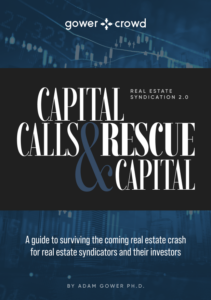An Overview of Real Estate Crowdfunding Law*
In recent years, there’s been an uptick in the number of real estate developers who utilize crowdfunding to source both debt and equity for their projects. The timing is no coincidence: there were major changes to federal regulations, starting in 2012, that opened the doors to allow general solicitation for investment in real estate deals.
Yet there are many nuances to the new regulations governing real estate crowdfunding—most of which are not well understood by either the average real estate sponsor or prospective real estate investors.
What is real estate crowdfunding?
Before we get started, let’s start with the basics. Real estate crowdfunding is a “new” term used to describe a practice first used to build the railroads after the American civil war in the latter part of the nineteenth century. It’s when a real estate sponsor pools capital from multiple sources to help fund a commercial real estate project. Investors then receive a pro rata share of the profits and/or interest payments based on the level of their investment.
Until recently, federal regulations required the sponsor to have a personal, pre-existing relationship with investors. That began to change in 2012 with the federal JOBS Act, which allowed sponsors to engage in “general solicitation” under certain circumstances (more on this below).
When people refer to real estate crowdfunding, most tend to think of online platforms like CrowdStreet or Fundrise—two of the more prominent marketplaces for sponsors looking to raise capital for their real estate projects. Dozens of platforms exist today. Some allow people to invest with as little as $100; others require more substantial investments and are only open to accredited investors.
Real estate crowdfunding is not limited to these platforms, though. Real estate sponsors can crowdfund capital using an array of tools and strategies, online of off, or some combination thereof. Increasingly, sponsors will develop their own portals for raising debt and equity and will market to prospective investors directly either in combination with or independently of these marketplace platforms.
Related Article: Guide to Real Estate Crowdfunding and Best Platform
Who can raise capital using real estate crowdfunding?
One of the reasons why crowdfunding is so appealing is because virtually any sponsor or real estate developer can raise capital using this tool. There are restrictions on how they raise capital, which we’ll cover in more detail below. But in terms of who’s eligible to raise capital using crowdfunding, any real estate sponsor can do so. This allows sponsors to get their projects in front of a wider, more diverse pool of potential investors than if they were raising capital through traditional means alone i.e. through personal networks and in-person meetings.
This is also a reason why investors must do their due diligence prior to investing. Not all sponsors are adept real estate professionals. Investors should always do their homework on sponsors prior to making any commitment, large or small, and should always seek the advice of professional financial advisors, accountants, and attorneys before investing.
What regulations govern real estate crowdfunding?
Before getting started with a real estate crowdfunding campaign, a sponsor will want to evaluate the ways they can do this. There are a few different options available and each way has its own rules and regulations in terms of who can invest and under what conditions.
Here’s a very simplified version of otherwise very complicated laws:
- Regulation D of the Securities Act: The federal Securities Act regulates the entire process of selling securities. Historically, anyone wanting to advertise their securities to the public had to conduct an official IPO. This made it difficult for real estate developers to raise capital; most deals were not worth the time and aggravation of going through the IPO process. Rule 506 of Regulation D provides the pathway for sponsors to crowdfund capital for real estate projects, and is made up of two key parts:
- Rule 506(b): This allows sponsors to raise an unlimited amount of money for their real estate deals, as long as they have a pre-existing relationship with the investor(s). The sponsor cannot use general solicitation or advertising to market their real estate securities. However, sponsors can raise capital from both accredited (unlimited) and (up to 35) non-accredited investors alike. Investors can self-certify as an accredited investor via a simple questionnaire. Nothing in 506(b) prohibits a sponsor from providing educational materials to anyone via their website, social media or by email.
- Rule 506(c): This rule allows anyone issuing securities to utilize general solicitation or advertising to market their offerings to investors. Unlike Rule 506(b) offering, these offerings are only available to accredited investors, and the sponsor must take “reasonable steps” to verify that all purchasers are accredited investors (vs. the self-certification method described above). Accredited investors must have an annual income of at least $200,000 (or $300,000 in combination with a spouse) or a net worth in excess of $1 million, excluding the value of their primary residence.
- Regulation A of the Securities Act: Another way real estate developers raise capital for their deals is under Regulation A. Any company selling securities under Regulation A is required to file their offering with the SEC for review. The SEC must determine whether the offering is eligible under Regulation A prior to any capital campaign.
- Regulation A+: This regulation was implemented in 2015 and in effect, provides certain exemptions from state and SEC registration. These offerings are sometimes called “mini-IPOs.” Companies can raise up to $20 million in Reg A+ “Tier I” offerings and up to $50 million via “Tier II” offerings – each of which have their own requirements, including the level of SEC review needed prior to opening the offering.
Which crowdfunding offering type is right for you?
Whether you raise capital using Rule 506(b), Rule 506(c) or Regulation A+ will really depend on how much capital you need to raise, on what timeline, and the robustness of your existing digital marketing systems. As noted above, each regulation has its own limitations. In some cases, you must have a prior relationship with investors—and these relationships can take time to develop though you can certainly begin that process online.
For those with weaker personal networks but otherwise strong reach, a real estate crowdfunding campaign always starts with online marketing, but the use of Regulation 506(c) might make more sense when it comes to the legal structure.
When in doubt, real estate sponsors should always consult with their attorney. As Sidoti notes during our conversation, “It’s really important to follow the law, and these are tricky laws. Even the most experienced sponsors sometimes make a mistake or forget something when launching a crowdfunding campaign.”
How do I launch a crowdfunding campaign?
The foundation of any successful real estate crowdfunding campaign is investor education. In order to expand their reach and maximize exposure, sponsors will want to invest in robust educational materials that can be shared with their network, their network’s network, and so on.
Investor education can take many forms. Sponsors will often publish articles, podcasts, videos, newsletters and more that cover topics such as why cap rates matter, why they are bullish on certain markets, why they believe a certain product type or asset class holds promise, how they repositioned a property and the returns that generated for investors, etc.
“Whatever it is, you should tell people why you invest the way you do,” says Sidoti. “That is the first thing you want to start with and you never want to stop. You should never stop educating.”
Indeed, it is investor education that helps create the trust that you’ll need to convert prospects into active investors.
What’s considered the “tipping point” from investor education to active solicitation?
One thing that trips up many sponsors is the transition from investor education to active solicitation.
Let’s say you have an email distribution list of 25,000 people. A sponsor will have a personal relationship with some of these people, but certainly not all. For several months, the sponsor has sent to this mailing list robust educational materials that describes their investment philosophies, what trends they’re seeing in the marketplace, and more.
Now the sponsor has a great investment opportunity they want to feature.
This is when the sponsor will want to transition to active solicitation. In other words, you’re asking the investor to take an action of some sort.
Can a sponsor send out an email blast to all 25,000 people featuring that opportunity, including details such as minimum investment amount and projected IRR with a “call to action” asking them to invest now?
Well, this depends on how the crowdfunding campaign is structured. If the offering is under Rule 506(c), then yes, this email can go out to the full email list as long as they later certify that those who want to invest are indeed accredited investors. This email would also be allowed under a Regulation A offering, assuming the sponsor has been approved by the SEC.
However, this type of email would be prohibited with an offering under Rule 506(b), which does not allow for general solicitation. Sponsors must have a substantive preexisting relationship with investors under Rule 506(b).
A substantive preexisting relationship means that you have intimate knowledge of someone’s financial ability to invest. And this requires someone to be a sophisticated or accredited investor—those are the only two types of people who you can take money from under this rule, per the SEC.
(Note: a “sophisticated” investor is one who may not be accredited, but someone who otherwise understands the risks associated with investing).
What do sponsors need to know about “conditioning” the market?
We told you these rules were complicated. Case and point. Let’s say a sponsor wants to advertise a deal that is only available to accredited or sophisticated investors. Rather than providing deal specs in their email blast, they indicate they have a unique opportunity for select investors and say “click here to learn more.” On the subsequent page, the sponsor provides details about the deal, such as minimum investment amount and financial projections, again with the caveat that only accredited or sophisticated investors can invest.
It seems innocent enough, especially with the appropriate caveats. But someone might still consider this “conditioning” the market – the sponsor has provided enough information to lure the investor. Now they know there’s a deal to be had, which in some rare instances might be considered conditioning the market.
Get access to our FREE weekly newsletter exclusively covering the latest updates from the real estate crowdfunding world
How can you form a “preexisting” relationship with potential investors?
It might seem like a difficult hurdle to overcome - creating a preexisting relationship with masses of potential investors, - but there are ways to go about doing so.
Let’s say you have the deal of a lifetime. You’re raising capital under 506(b) for a project in Houston. What you should start by doing is continuing your investor education. Your materials could say, for example: ‘We have a great deal that’s coming up in Houston. We’re still very bullish on the Houston area because of XYZ reasons. If you want to learn more about why we’re so bullish about Houston, click here.’ And say all of that without providing a specific offer.
Now, when the investor “clicks here” and gets through that firewall, the sponsor can ask them to fill out an investor qualification form that includes enough detail to arguably create a preexisting relationship. The form will ask whether the person is an accredited or sophisticated investor, their income, education and more. Having this information in writing is better than asking the investor to call you because it creates a paper trail to rely on down the road if anyone questions whether the sponsor had a preexisting relationship with that person (calls are harder to trace).
While these investors may not be able to invest in the Houston deal today, the sponsor will be able to reach out to these folks with future investment opportunities.
What are some marketing tips for sponsors looking to launch crowdfunding campaigns?
Here are three useful marketing tips for sponsors looking to launch successful real estate crowdfunding campaigns.
1. Be sure to communicate with investors on a regular basis. Treat your investors with the utmost reverence and respect. Treat them like your grandma on Sunday afternoon. Always call your grandma on Sunday afternoon.
While a weekly call to each investor isn’t practical, the point is important. Investors want you to report to them on a regular basis, whether that’s monthly or quarterly. If a sponsor pledges to do so, they must follow through accordingly.
The same idea applies to communicating with your general audience. Continue to put out educational materials, even when you’re not actively offering a deal, to further develop relationships and build trust. This will help convert more prospects into actual investors.
2. Remember that whatever you post on the Internet lives on forever. We’ve seen too many real estate sponsors post inappropriate material, either on their personal or business accounts, that they later regret. It can take months, even years, to build a positive reputation. It can take seconds to destroy a reputation. Sponsors should avoid posting anything overly political or questionable on the internet. You start chipping away at your credibility as an issuer. Even if a sponsor deletes the content, there’s always a risk that someone has taken a screenshot of that material and that it will live on forever.
3. Have respect for people. This seems obvious, but it’s amazing how many people get this wrong when marketing their crowdfunding campaigns. If someone makes a comment on your social media post, or if they’re looking for feedback on something, take a few minutes to engage. Be respectful of their time, thoughts and feelings. Try to think about a person’s feelings. Even though feelings are fleeting, the feelings are the soul of the person who’s on the other side of that computer screen.
Conclusion
As we’ve seen here today, the laws governing real estate crowdfunding campaigns can be convoluted—but that shouldn’t scare away sponsors. Real estate crowdfunding is a highly effective tool for raising debt and equity for projects, increasingly so during a time when traditional sources of capital might be harder to come by. A thoughtfully structured campaign, rooted in robust investor education, can produce long-term results for sponsors looking to grow their network of partners.
* The information on this page and content of the article are not a replacement for paid legal advice from a qualified professional attorney. Do not rely on anything in this article or on this website for legal advice but consult with an attorney at all times.
If you have only just started in real estate development, have completed no deals, have no email list, but know you want the freedom and wealth being a real estate developer brings, then I suggest your first step is to start evaluating deals so you can recognize a good one when you see it.
Here’s where you should start. You’ll learn everything you need to know – the different types of real estate, different development strategies, how real estate cycles influence the market, and all about due diligence.
If you want to find deals and raise money for them so you can start your real estate development business, then learning how to conduct due diligence so you can pitch your deals better to investors is a great place to start.
If you’ve already purchased one or more real estate project and are seeing more opportunities than you can finance, then now is the time to start building your investor network so you can finance all your next deals quicker.
You’ve already got some momentum; now start finding and educating prospects about what you’re doing so you can build an email list of people to pitch to when you’re ready to raise money for your next deal.
This is what we build for private clients all the time – it’s called the Investor Acquisition System and you can access the entire program right here so you can find prospects, and convert them into being deep pocketed, repeat investors in your deals.
If you are a seasoned pro with multi-cycle experience, a substantial portfolio, a decent deal pipeline, and find yourself spending too much time raising equity capital because you’re still doing it in-person, then it’s time you put technology to work for you.
The wonderful thing about doing this is that you’re not going to be doing anything different than you’re already doing and, guess what, you’ll never have to sit through investor meetings again.
Sounds crazy I know, but I lay the whole thing out for you in this white board workshop where I personally show you exactly what it takes for you to transform your equity raising into a fully automated, capital raising machine so you can find new investors while increasing commitments from your existing network.






